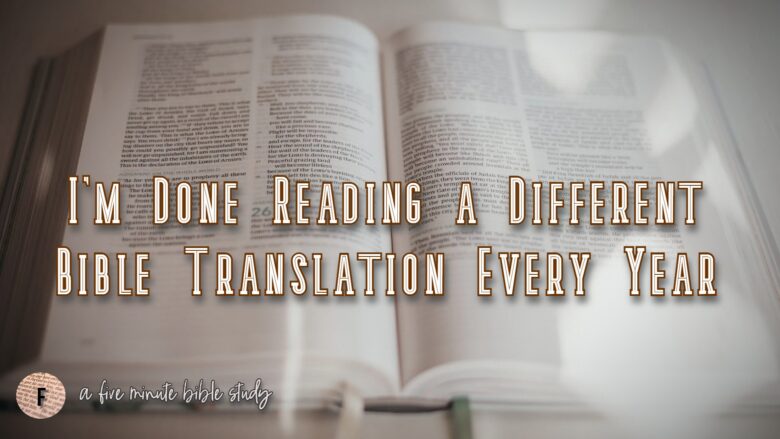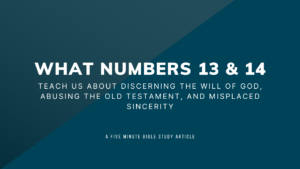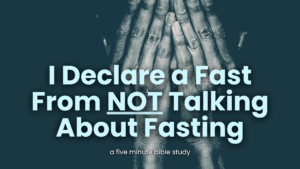I’m done reading through a different Bible translation every year. Just two hours ago I finished up the Christian Standard Bible (CSB) which closes with Revelation 22:21, “The grace of the Lord Jesus be with everyone. Amen.” I closed my Bible with great joy and satisfaction. Part of my joy was that I finished what I set out to do at the beginning of the year: read the Bible through from Genesis to Revelation. Another large part of my joy was grounded in the fact that I am now free to go back to reading the good ole New King James Version (NKJV) translation! Of course, no one was holding a gun to my head, telling me to finish the CSB or else… But I had made a personal commitment to read through the CSB in 2022, and when I make personal commitments like that one, I become very upset with myself for not following through. So, I followed through; nonetheless, I’m not going to follow through with a much weaker commitment I made to myself two years ago.
My 2021 Reading Goal
It’s a bit overblown to call it “My 2021 Reading Goal,” but in January of that year I decided to read through a different translation of the Bible from year to year. In 2021 I read through the NIV 2011, and in 2022 I read through the CSB. It wasn’t like I looked in the mirror in January of 2021 and said, “I’m gonna do this!” slapped myself in the face four times, and went off to read a new translation. I wasn’t that serious about this reading goal. It played in my head a little more like, “Huh, that sounds like a good idea; I think I would like to do that.” I didn’t have a rigid schedule of which translation I would read from year to year, but I figured I would wait till the beginning of each year and go with whichever translation I had on my mind to read. Originally, I thought of certain benefits to this new reading practice. I had grown up hearing different Christians and/or preachers speak disparagingly of newer Bible translations like the NIV and others. When I heard them speak this way, their accusations against new translations, especially dynamic equivalents, were very vague. I thought to myself, “I’m gonna read them for myself. And then I can tell whoever asks me about a certain translation, ‘I read it all the way through, and I like it.'” There is certainly some benefit to be able to say, “I’ve read that.” Many people that speak badly about something are not speaking from personal testimony but secondhand. Secondhand testimony is not necessarily invalid, but you can understand how, “I read it myself,” carries a little more weight. Secondarily, I figured that reading through different translations would help me to understand the scriptures better by seeing how certain texts were translated differently. I figured I would be able to notice those differences as I read, especially those texts I am intimately familiar with. So, that’s what I did. I started reading through a different translation every year. Two years later and… I’m done with this “good idea.” I’ll tell you why.
Why I Called Off My “Good Idea”
Now, don’t misunderstand me. I’m not saying that it’s BAD to read through a different translation every year. You’re welcome to do this, and I’ll even give you my blessing if that matters to you, but let me just explain why I decided to quit this practice.
First, this practice took away from my joy of daily Bible reading and was less helpful than I expected. I have a very bad memory. Any one that lives around me and knows me well can attest to that. So, while I supposed that I would be able to notice major differences in translation as I read through the Bible each year, I found this to be more ideological than practical. Unless I have a little notebook and pencil handy at all times when reading through my Bible, I will never remember all the verses and phrases where a significant difference in translation is obvious. When I read through the NIV 2011, I actually had a little, black notebook handy for this very reason. However, I found this to make my daily reading much more cumbersome, and it honestly removed some of the joy from my daily habit. Furthermore, I found that, even with a notepad handy, there were still a lot of translation variants getting past me. This past year I studied with an individual who would read from the CSB while I read from the NKJV. It proved to me how much I was missing in my cursory reading of the CSB from day to day. Ultimately, I found this benefit to be less of a true benefit and more of a sap on the joy I draw from daily Bible reading. Unless you are actively reading from multiple translations at the very same time on a given passage or chapter of scripture, it is impractical to think that the average or above-average reader will be able to pick up on translation variants in a meaningful way.
Second, I discovered that reading from different translations all the time reduces memory of scripture. Whether it’s a phrase in scripture or an entire verse of scripture, it’s much easier to remember that phrase/verse when you read it from the same translation over and over. That same ability to remember a phrase/verse is greatly hindered when you are reading through different translations all the time. I’m already bad about memorizing scripture (something I decided I wanted to improve on this last year), and when this reading tip was brought to my attention, it convinced me even more that I would stick with reading through the same translation every year.
Third, I grew up on the NKJV, and I prefer the way it reads over all other translations. This is not to say that the NKJV has bragging rights as the best translation there is. I’m simply saying that I prefer its language, because I’ve either heard this translation read to me or I’ve read it myself since I was a baby (up until the last couple of years). No doubt, the more familiar you are with something, the more comfortable you become with it, and the more you are likely to prefer it over an alternative. This is the only reasonable explanation as to why some children prefer McDonalds chicken nuggets to fine cuisine: their taste buds have grown accustomed to spew.
Fourth and finally, I learned that reading from the same physical Bible aids memory and familiarity of scripture. By necessity, reading a new Bible translation every year will mean reading from a different Bible with a different layout. Matthew 22:3 might be on the right side of the page in the bottom right corner in one Bible, while it’s on the left side of the page in the top right corner of another Bible. That may seem insignificant at first, but when you have read from the same Bible for 10-20 years, you will find that you may not know precisely the book, chapter, and verse of a particular saying of Jesus, but you know what the page looks like in your Bible. Because you remember what the page looks like, you can find the verse much easier. Again, familiarity with your physical Bible aids in recall. I have found this to be helpful when studying with others. If I am using a physical Bible (even another NKJV) that is not my Bible, I find myself less comfortable finding passages of scripture that I want someone to look at and read. But if I have my NKJV Cambridge Bible with wide margins where my notes are handwritten in, I feel very comfortable, and I’m even likelier to remember an important point in the margins that I had forgotten. The same thing could be said for reading from a chronological Bible or reading plan. I’ve read through a chronological Bible before, but this comes at the cost of familiarity with your physical Bible. Add in digital Bibles here as well (Bibles on apps).
Conclusion
In my experience and opinion, there is great benefit from reading from the same physical Bible and translation every year again and again. With that said, I am really excited to get back to reading through and from the good ole NKJV that I study and preach from. There’s nothing like it to me personally, and it makes me excited to start 2023! When it’s all said and done though, read the Bible! If reading on your phone makes you more likely to read the Bible, then read on your phone. But if you’re ready to take your reading to the next level, or you are about psychoanalyzing Bible reading like me, then consider the reasons why I’m done reading from a different Bible translation every year.



